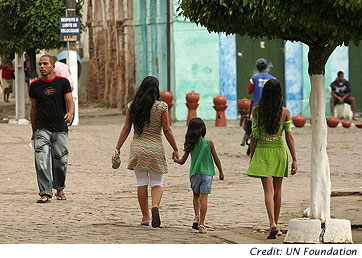
 RECIFE, Brazil (WOMENSENEWS)–Monica, 22, got married at age 21, but has already divorced her husband.
RECIFE, Brazil (WOMENSENEWS)–Monica, 22, got married at age 21, but has already divorced her husband.
"Our marriage lasted six months, but it feels like it has been 10 times longer," says Monica, who requested her name be changed for safety reasons.
She says her ex-husband insulted her daily, accused her of doing things incorrectly and forced her to ask for his forgiveness, although she says she didn’t do anything wrong. He once accused her of having an affair because she spent too long at the grocery store, she says, and then refused to let her leave their house in Recife, the capital of Pernambuco, a state in northeastern Brazil.
"As if it was not enough, he used to order me to keep smiling, saying I did not have anything to be angry about and that I should not be ungrateful for everything that he did for me," she says.
When he threatened to kill her, she decided to leave him. With her family’s support, she escaped one day when he wasn’t home.
Police accompanied her to obtain her belongings from their home. The Public Ministry, the institution responsible for ensuring citizens’ rights and constitutional rules here, helped her press charges against her ex-husband for the death threat.
Now she is a trainee at a local company and says she wants to go back to school. But she is still undergoing psychological treatment and regularly visits the municipal assistance center for domestic violence victims.
Domestic violence incidences in Brazil have decreased slightly during the past decade–a woman here is battered about every 24 seconds now instead of every 15 seconds as in 2001, according to a 2010 report by the Perseu Abramo Foundation, a Brazilian political think tank. Husbands and boyfriends are the chief perpetrators.
A Private Matter
While less than 10 percent of men said they would hit a wife or girlfriend, 25 percent said they knew a close relative and nearly half said they knew a friend or acquaintance who had, according to the report. One in five women said they’d been victims of domestic violence, but this number doubled when the women were made aware of the 20 different types of abuse.
Domestic violence worldwide has long been considered a private matter by neighbors, the community and the government, according to the United Nations.
The victims felt very exposed while bringing to the public sphere the problems that they wanted to have solved "within the walls of their homes," says Anne Marrye de Deus, a psychologist who worked for a victim referral center.
Survivors cited fidelity, women’s desire for autonomy and men’s aggressive predispositions as the top reasons for domestic violence in Brazil, according to the foundation report.
Others say domestic violence is tied into the country’s history and culture.
"There is a very expressive culture of violence against women in Brazil," says Marilia Montenegro, a criminal law professor and domestic violence researcher. "The role of the woman has always been very domestic, very restricted to the privacy of households, strongly permeated by patriarchalism."
Criminal prosecutor Sineide Maria de Barros says that most men here are socialized to believe that their desires outweigh women’s. She added that women lack financial independence, creating a higher tolerance for gender-based violence.
The Brazilian parliament passed a domestic violence law in 2006. It is named for Maria da Penha, a Brazilian woman whose husband received only two years in prison for trying to kill her twice and leaving her paraplegic.
The law defined domestic violence clearly for the first time in Brazil and tripled the severity of sentences, according to the Organization for Economic Co-operation and Development.
Time and Will Needed
"The Maria da Penha Law established many changes, both in the definition of crimes and in judicial procedures," psychologist de Deus says. "However, just like all changes, time and will are needed in order to deconstruct something old and rooted in society."
Montenegro says the law has many positive aspects, including public policy implementation and the creation of courts specifically for women, but is weak in criminal and procedural law.
"Criminal law, in general, creates a false expectation to society," Montenegro says. "It sometimes works as a ‘makeup’ for certain situations that demand a much more comprehensive approach, including, for instance, economic and educational investments."
Criminal prosecutor de Barros says that the law has also made victims more afraid to denounce their aggressors because the punishment is more severe and they lack financial autonomy, love the perpetrators or fear raising the children alone. She says that complaints filed annually in the region where she works declined from around 4,000 before the law to around 2,000 after the law.
The state government and civil society organizations in Pernambuco are working to complement the federal law.
Cristina Buarque, Pernambuco’s state secretary for women’s policies, leads programs to tackle domestic violence from three fronts: health, law and education.
Curumim Group encourages women’s political participation to promote gender equality, while the Papai Institute recruits men to achieve this aim.
University student Italo Ribeiro says his organization, React and Change, focuses on youth because they constitute the majority of perpetrators and victims of gender-based violence.
"It is necessary that women and men join their efforts for a reorganization of the principles that structure society," psychologist de Deus says. "This way, violence will not be anymore a resort for the maintenance of unequal power relations."
Would you like to Comment but not sure how? Visit our help page at https://womensenews.org/help-making-comments-womens-enews-stories.
Would you like to Send Along a Link of This Story?
https://womensenews.org/story/domestic-violence/110624/gender-violence-now-public-matter-in-brazil
ATTRIBUTION: Adapted from original content published by the Global Press Institute. Read the original article here. All shared content has been copyrighted by Global Press Institute.
Thais Moraes reports for Global Press Institute’s Brazil News Desk. She covers human rights, justice and development issues.


